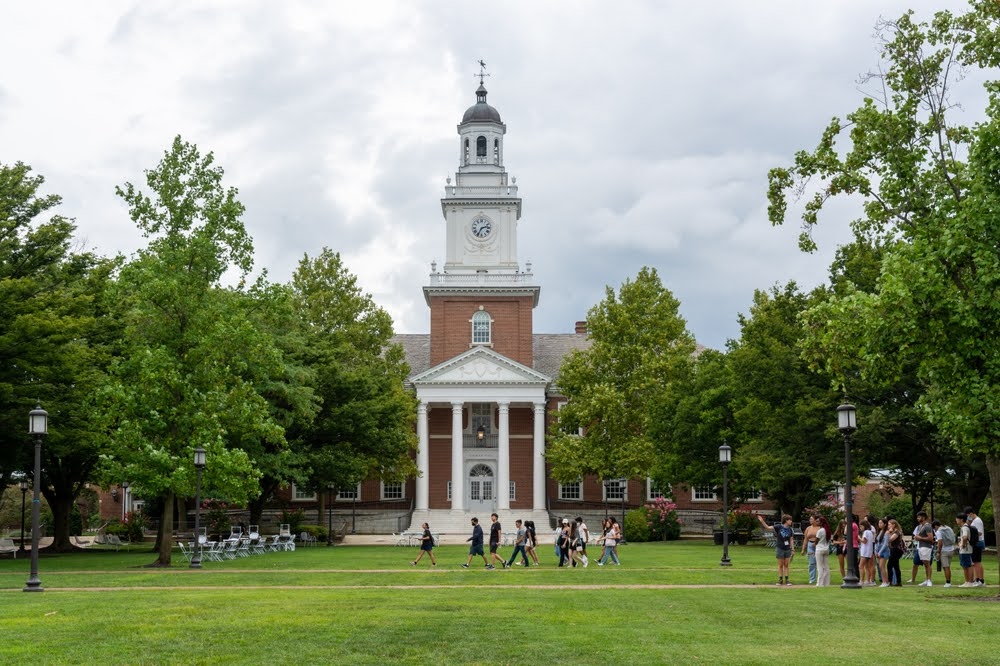
Johns Hopkins University (JHU), located in Baltimore, Maryland, is one of the most prestigious research universities in the world. Founded in 1876, it bears the name of its first benefactor, Johns Hopkins, an American philanthropist, abolitionist, and businessman. Known for its rigorous academics, cutting-edge research, and commitment to innovation, JHU consistently attracts some of the brightest minds globally. If you are considering applying to Johns Hopkins, understanding its acceptance rate, rankings, and tuition fees will help you make an informed decision.
Johns Hopkins University Admissions
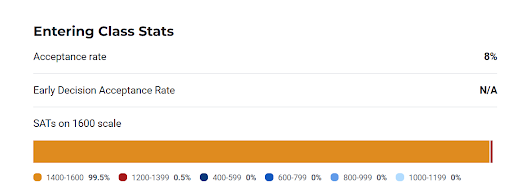
Recommended Reading: How Robotics Certification Can Help You in College Admission?
Admissions & Academics Deadlines & Requirements for First-Year Applicants- (2025-2026)
- Application Deadlines: Jan 2, 2026, for Undergraduate Early/Regular Decision.
- Deadline for housing deposit: Around May
- Application Fee: $70
- Acceptance Rate: 6%
- Common Application Accepted: Yes
Fee Waivers
If you are eligible due to financial need or other factors, you can apply for a waiver of the application fee directly through the Common Application or Coalition Application.
Johns Hopkins University has an acceptance rate of 6%. Among applicants who submitted test scores, half of those admitted have an SAT score between 1520 and 1570 and 1580 or an ACT score between 34 and 36. However, one-quarter of admitted students scored above these ranges, while another quarter scored below. The application deadline for Johns Hopkins University is January 2.
Admissions officials at Johns Hopkins University consider a student’s GPA a very important academic factor. When available, an applicant’s high school class rank is also considered very important, along with letters of recommendation. To explore additional academic factors and other school data, learn more through College Compass.
Source: https://www.usnews.com/best-colleges/jhu-2077/paying
Key Factors Influencing Admissions:
- Academic Excellence: Applicants are expected to have a strong 3.9 GPA, competitive standardized test scores (SAT/ACT), and a challenging high school curriculum.
- Extracurricular Activities: JHU values well-rounded individuals who demonstrate leadership, innovation, and a passion for their chosen fields.
- Essays & Recommendations: Compelling personal essays and strong letters of recommendation are critical to the selection process.
Ranking
Johns Hopkins University consistently ranks among the top universities in the United States and the world. Its emphasis on research, academic excellence, and faculty expertise has earned it recognition across various ranking platforms:
#7 in National Universities
#12 in Best Value Schools
#13 in Engineering Programs (Doctorate)
Johns Hopkins University Academics
Johns Hopkins University has a 6:1 student-to-faculty ratio and follows a 4-1-4 academic calendar. The most popular majors at Johns Hopkins University include: Cell/Cellular and Molecular Biology; Computer and Information Sciences, General; Public Health, General; Neuroscience; Bioengineering and Biomedical Engineering; Chemical Engineering; Econometrics and Quantitative Economics; Music Performance, General; Mathematics, General; and International Relations and Affairs. The average freshman retention rate, an indicator of student satisfaction, is 97%.
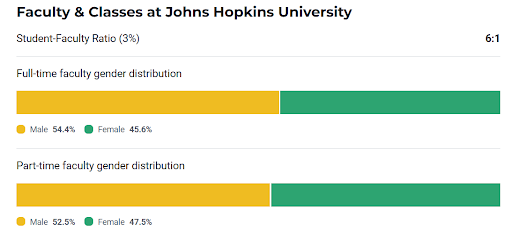
Johns Hopkins University Majors
Here are ten most popular majors graduates:
| Academic Field | Percentage |
|---|---|
| Cell/Cellular and Molecular Biology | 14% |
| Computer and Information Sciences, General | 10% |
| Public Health, General | 8% |
| Neuroscience | 10% |
| Bioengineering and Biomedical Engineering | 8% |
| Chemical Engineering | 5% |
| Econometrics and Quantitative Economics | 5% |
| Music Performance, General | 5% |
| Mathematics, General | 3% |
| International Relations and Affairs | 3% |
Johns Hopkins University Academic Programs & Offerings
Degrees Offered
- Certificate
- Diploma
- Bachelor’s
- Post-Bachelor’s Certificate
- Master’s
- Post-Master’s Certificate
- Doctorate – Professional Practice
- Doctorate – Research/Scholarship
Combined-Degree Programs
- BA or BS/BM
- BA/MA
- BA/MHS
- BA/MS
- BA/MSE
- BA/MSPH
- BS/MBA
- BS/MS
- BS/MSE
Johns Hopkins University Tuition & Financial Aid

Johns Hopkins University’s tuition is $67,170, which is higher than the national average of $47,097. This amount includes both tuition and fees, often referred to as the sticker price. Fees vary by institution and may cover services such as library access, student gyms, student centers, technology resources, and campus health services.
When comparing costs across different institutions, it’s important to also consider the total cost and net price. The total cost includes the sticker price along with expenses for food, housing, books and supplies, transportation, and personal expenses. At Johns Hopkins University, the total cost is $$88,976. The net price, which reflects the average cost after aid and scholarships are applied, is $25,575 for students receiving need-based assistance.
Johns Hopkins University Tuition & Expenses
Tuition and fees
| Category | Amount |
|---|---|
| Net Price for Federal Loan Recipients (2025-2026) | $67,170 |
| Net Price by Family Income (2022-2023) | $20,820 |
| Family Income | Total Debt |
|---|---|
| $0 - $30,000 | $156 |
| $30,001 - $48,000 | $4,342 |
| $48,001 - $75,000 | $6,419 |
| $75,001 - $110,000 | $12,838 |
| $110,001+ | $39,451 |
| Food and Housing | $21,002 (2025-26) |
Financial Aid Statistics for Johns Hopkins University
Financial aid is funding that students can use to cover college expenses and is typically awarded based on need or merit.
Need-based aid is determined by your or your family’s ability to pay for college, as assessed through the Free Application for Federal Student Aid (FAFSA). The average need-based scholarship or grant given to first-year students at Johns Hopkins University was $65,703. In addition, 52% of first-year students received need-based financial aid in fall 2023.
Need-based self-help aid includes federal loans and work-study opportunities. The average amount of need-based self-help aid awarded to first-year students was $2,217.
Johns Hopkins University met 100% of its students’ financial aid needs. Continue reading to learn more about the different types of aid available.
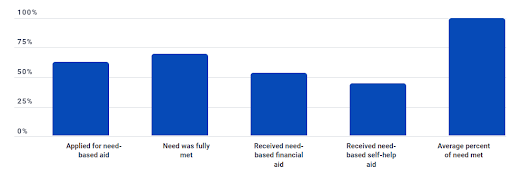
Why Choose Johns Hopkins University?
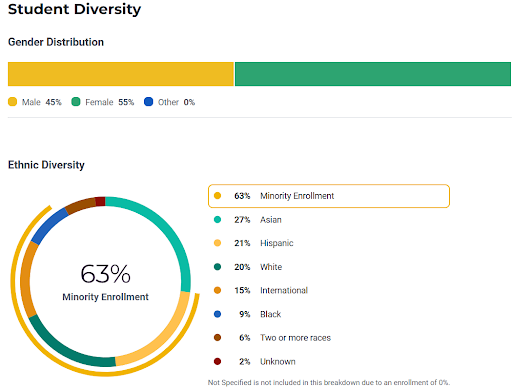
1. World-Class Research Opportunities: JHU is a leader in research, with over $3 billion in annual research funding. Students have access to state-of-the-art labs and facilities.
2. Strong Alumni Network: Graduates of Johns Hopkins go on to excel in various fields, including medicine, engineering, politics, and business.
3. Global Perspective: JHU offers study-abroad programs, global research initiatives, and a diverse student body from over 100 countries.
4. Top-Notch Faculty: Students learn from Nobel Prize winners, industry leaders, and pioneers in their respective fields.
Student Loan Debt for Johns Hopkins University
The amount of student loan debt you accumulate can impact your financial situation long after college. Ideally, your total student loan debt should be less than your expected starting salary upon graduation.
At Johns Hopkins University, the median federal loan debt for borrowers who completed their undergraduate degree is $10,250. The median monthly federal loan payment (if repaid over 10 years at a 5.05% interest rate) for federal loan borrowers who graduated is $109.
Additionally, 6% of graduating students at Johns Hopkins University took out private loans. These students had an average of $64,731 in private loan debt at graduation.
Typical total federal loan debt after graduation – $10,250
Typical total federal loan debt among those who did not graduate – $5,750
Typical total federal loan debt by family income
| Family Income | Total Debt |
|---|---|
| $0 - $30,000 | $7,395 |
| $30,001 - $75,000 | $8,297 |
| $75,001+ | $10,000 |
| Typical Monthly Loan Payment | $109 |
Undergraduates paying down their federal loan debt by family income
| Family Income | Total Debt |
|---|---|
| $0 - $30,000 | N/A |
| $30,001 - $75,000 | N/A |
| $75,001+ | N/A |
| Average Total Indebtedness of 2024 Graduating Class | $30,803 |
| Graduating students who have borrowed (any loan type, 2024) | 20% |
Scholarships
Scholarships are a type of funding that you don’t need to pay back. Need-based scholarships take a student’s financial status into account. Merit-based scholarships are awarded to students for academic or athletic achievement. You might also qualify for a scholarship based on your community service involvement, unique hobbies or traits, your personal background, or a parent’s employer or military affiliation.
Some students receive enough in scholarship money to cover their tuition and living expenses. See the types of scholarships and grants available at Johns Hopkins University below.
Conclusion
Johns Hopkins University is an excellent choice for students seeking academic excellence, research opportunities, and a global perspective. While its acceptance rate is competitive and tuition costs are high, JHU’s financial aid options and the quality of education provided make it a worthy investment. Whether you aim to pursue medicine, engineering, or international relations, Johns Hopkins University can be the stepping stone to a successful future.
Moonpreneur is dedicated to transforming conventional education, preparing the next generation with comprehensive learning experiences. Our Innovator Program equips students with vital skills in AI/ML, Robotics, Coding, Game Development, and App Development, fostering entrepreneurship through hands-on learning. This initiative aims to cultivate the workforce of tomorrow by integrating innovative technologies and practical skills in school curricula.
Register for a 60-minute free workshop today!
Update: This article was last updated on 4 February 2026 to reflect the accuracy and up-to-date information on the page.
























